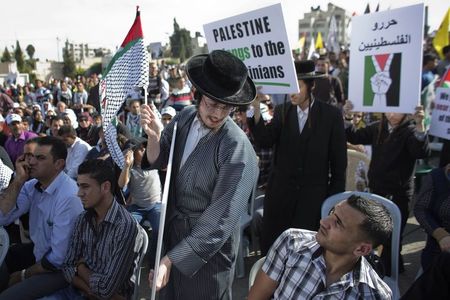RAMALLAH (Reuters) - Palestinian President Mahmoud Abbas on Tuesday accused his Islamist Hamas rivals of carrying out a series of bombings against officials loyal to him in Gaza last week, in a move sure to harm already floundering unity efforts.
A series of small explosions targeted the homes and vehicles of officials from Abbas's Fatah movement on Friday, causing minor damage but no injuries.
A bomb also demolished a stage erected to commemorate the 10th anniversary of former president and Fatah leader Yasser Arafat's death, leading to the event being cancelled.
"Who committed this crime? The leadership of the Hamas movement did, and it's responsible!" Abbas roared to applause at a Fatah rally for Arafat in Ramallah, his seat of government in the Israeli-occupied West Bank.
Hamas and Fatah agreed in April to form a reconciliation government, an effort to overcome deep political rifts that date back to 2007, when Hamas seized power in Gaza after a weeks-long civil war with Fatah.
The parties agreed in September that Hamas would relinquish Gaza's land crossings with Israel to the unity government in order to facilitate the entry of reconstruction aid. A devastating 50-day war with Israel in July and August levelled whole neighbourhoods and left thousands of Gazans homeless.
Amid mutual blame, no change of guard occurred and almost no building materials have entered the Strip.
"These actions delay rebuilding and delay the moving of 100,000 people back into their homes ... The one loser is the people - in the war, in the rebuilding and in everything - while you sit in your homes and your hideouts with no concern except to say 'we're staying put'," Abbas fumed, rhetorically addressing Hamas leaders.
Hamas denounced the remarks, which stopped short of calling for a formal break with the Gaza-based Islamists.

"Abbas's speech was aimed at causing tensions. It's a partisan and despicable speech that did not carry any good intentions, neither towards Hamas nor towards the people of Gaza," Hamas spokesman Fawzi Barhoum said.
(Reporting by Noah Browning and Nidal al-Mughrabi; Editing by Jeffrey Heller and Mark Trevelyan)
